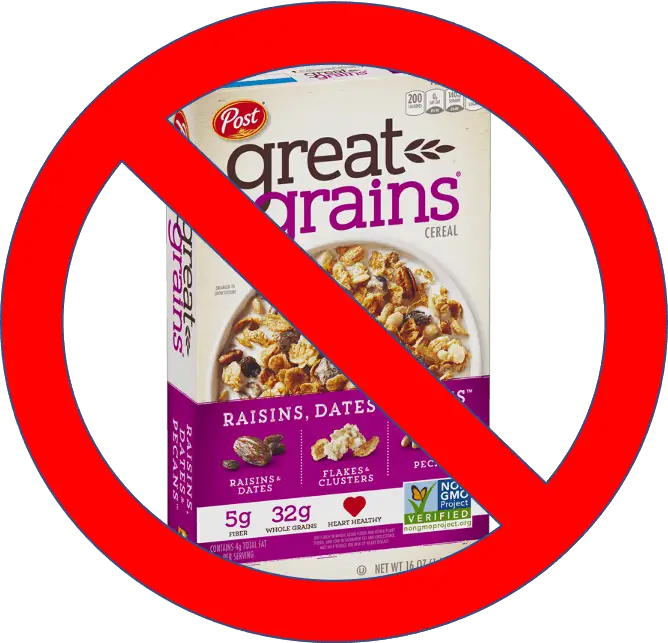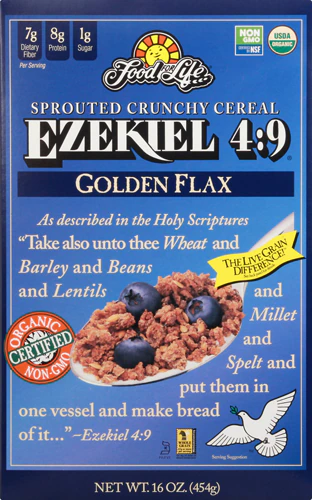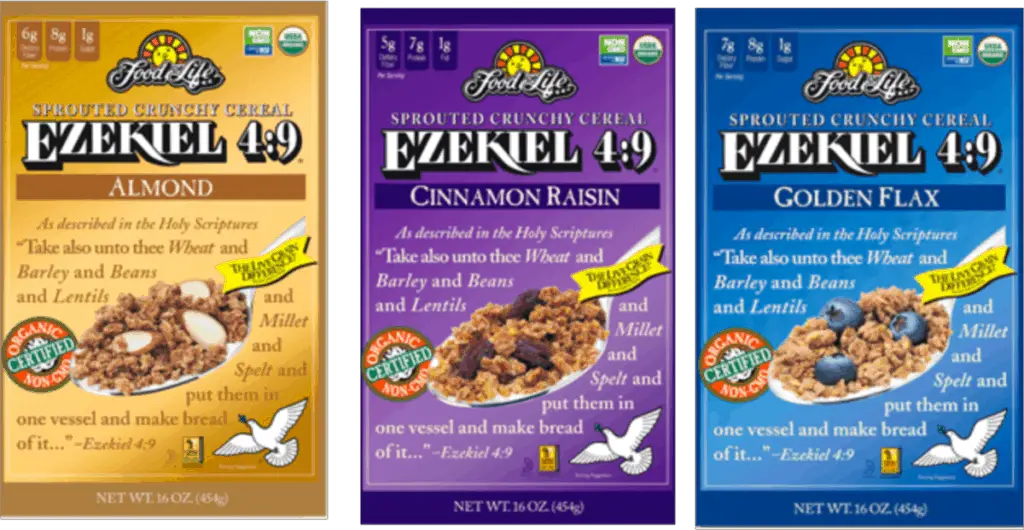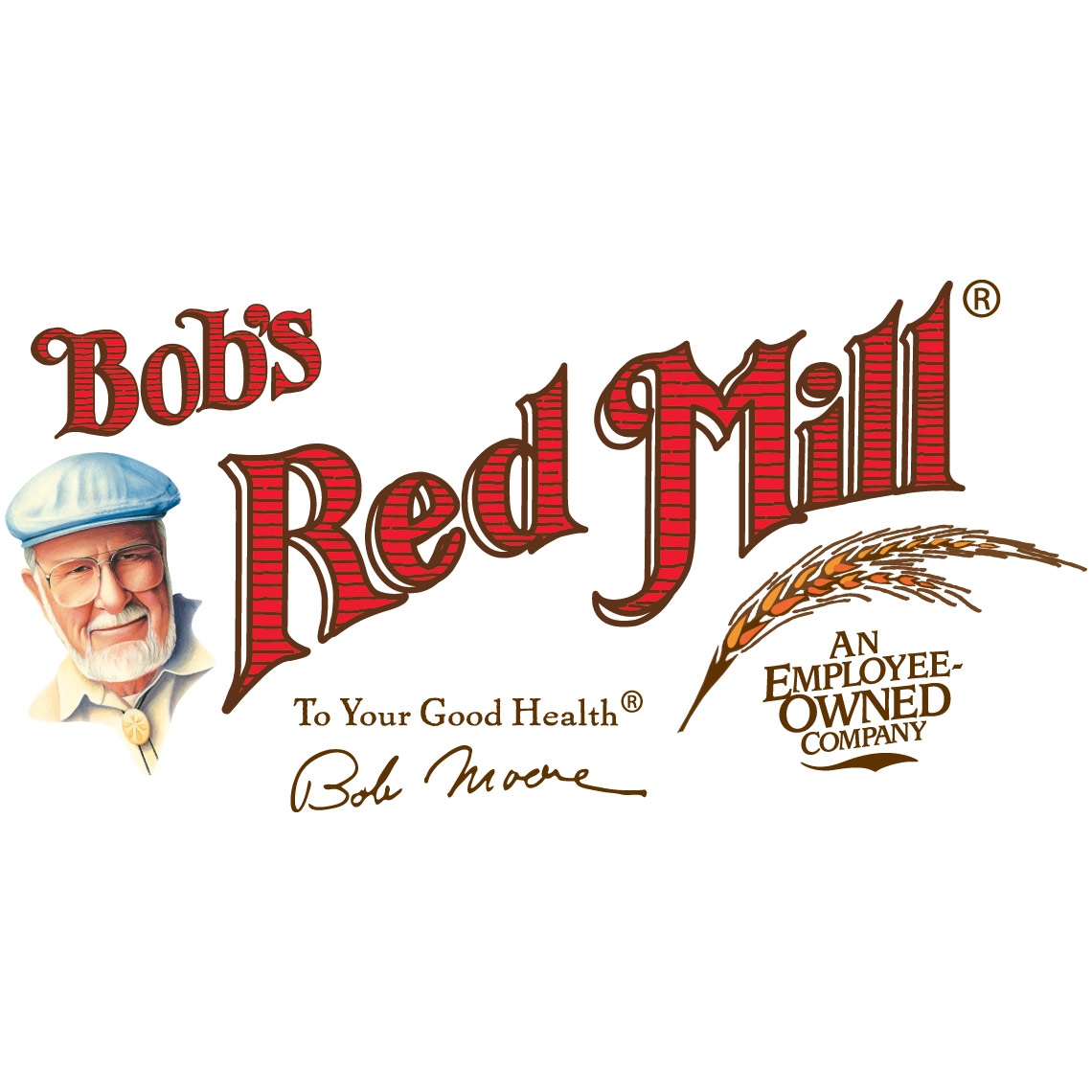
Ready-to-eat breakfast cereal is super convenient. It’s ready in a minute and can be a great way to get fiber and nutritious grains into your diet.
The problem is finding a healthy cereal. So many brands are loaded with sugar or are highly processed—even when they are marketed as healthy.
In this article, I’ll share little-known facts about cereal processing, and then give you my top 13 healthiest breakfast cereal brands, including ingredients lists.
Sugar Shocker
Let’s take Post’s Great Grains Raisins, Dates and Pecans cereal as an example of a brand that is marketed as healthy. Sugar is the third ingredient after wheat and raisins, well ahead of pecans, which are ninth, even though pecans are in the brand name and are called out on the front of the box.

Sugar is hidden within other ingredients as well. This cereal contains rice syrup and molasses, which are also sweeteners. In fact, Post’s Great Grains Raisins, Dates and Pecans cereal contains 26 grams of sugar in a typical 1 1/2 cup serving size (note the label’s nutrition info is based on an unrealistically small 3/4 cup serving size). 26 grams of sugar is 2 1/8 tablespoons! Imagine putting that much sugar on your home-cooked oatmeal.
In addition, this cereal contains canola oil, which is highly refined, typically GMO, and high in omega-6 fats, which most Americans need to reduce. It also contains BHT, a preservative that is banned in the EU due to its link to cancer.
Processing Exposé
Another consideration is the highly processed nature of most breakfast cereals. Did you know that flakes and shreds are not how the grain comes off of the plant? Nor do those shapes form naturally during cooking.
Most prepared cereals are made by grinding down the seed kernels of grains—even whole grains—and turning them into flour. The flour is then mixed with water to form a slurry, which is cooked, and then either rolled flat or extruded and cut into various shapes like flakes and shreds. It is then cooked again at high temperatures and dried.
What’s wrong with that process? Even if made with whole grains, breaking down the seeds into flour particles destroys cell walls and a significant amount of the nutritional content. And the high heat, pressure, and shearing action needed for extrusion destroys and alters molecules in the grain. A clinical paper says: “The thermomechanical action during extrusion brings about gelatinization of starch, denaturation of protein, and inactivation of enzymes, microbes and many anti-nutritional factors.” (see Resources below).
Furthermore, a 2015 study (see Resources, below) says: “When wheat is milled into wheat flour, there is an approximate 70% loss of vitamins and minerals (range 25–90%) and fiber, 25% loss of protein, 90% loss of manganese, 85% loss of zinc and linoleic acid, and 80% loss of magnesium, potassium, copper, and vitamin B6.” In addition, the high heat of the multiple baking processes further degrades nutrients.
Also, the high-heat cooking process necessary to create puffed cereal causes acrylamide to form. Acrylamide is found in many foods, but in high amounts, it is associated with cancer (acrylamide formation is why we are advised to avoid eating charred meat).
I don’t want to be alarmist; there are no studies showing that puffed cereal causes cancer. But I do want to heighten awareness of these issues in a food category that has one of the biggest discrepancies between perception and reality when it comes to nutrition. Many breakfast cereals are marketed as nutritious when in fact most of the nutrients are sprayed on at the end of the manufacturing process, after the healthy parts of the grain have been removed or destroyed. You may as well eat cardboard and a vitamin pill, with loads of sugar to make it palatable.
But there are some great cereal options out there. I set out to find the healthiest brands available, researching options at grocery and health food stores, and online. My findings are below. I tried them all, and also provide information on how tasty I found each cereal to be.
Criteria for a Healthy Cereal
Here is how I define healthy when it comes to cereal:
- Contains whole grains
- Is low in added sugar
- Has no artificial colors or flavorings
- Has no preservatives
- Is minimally processed, including not made from flour, and is not extruded or puffed
- Does not contain added vitamins or minerals (I prefer to get my nutrients from food or a vitamin pill of my choosing)
I also look for cereals high in fiber. I have a separate article surveying the fiber in 62 popular cereal brands; one has significantly more fiber than any other brand. Read it here.
And the winners are for overall healthiest cereals are….
The 13 Healthiest Breakfast Cereals
1-4. Ezekiel 4:9

This is far and away the best cereal, in my book. They use sprouted whole grains and lentils—sprouting increases the nutrient levels. Where else can you get lentils in your breakfast cereal? The back story is that their blend of grains and lentils comes from a description in a bible passage. There is no added sugar and all ingredients are organic. The malted barley lends a mild sweetness.
This cereal is dense and hearty; a 1 cup serving is typical and contains 2 grams of sugar, or less than half a teaspoon.
It’s one of the very few prepared cereals that isn’t made from flour. And they use a slow-bake method that protects the nutrients.
I think it tastes great. It comes in a small, hard shape, very similar to Grape Nuts. It stays crunchy in milk.
Ezekiel offers several varieties, all of which meet my criteria for healthy: Original, Golden Flax, Almond and Cinnamon Raisin.

You can find Ezekiel cereals at many grocery stores, health food stores and online. The manufacturer’ suggested retail price is $5.49 a box; you’ll pay more if you buy online.
Here is the complete list of ingredients:
- Original: Organic Sprouted Wheat, Organic Sprouted Barley, Organic Sprouted Millet, Organic Sprouted Lentils, Organic Sprouted Soybeans, Organic Malted Barley, Organic Sprouted Spelt, Filtered Water, Sea Salt.
- Golden Flax: Organic Sprouted Wheat, Organic Golden Flax Seeds, Organic Sprouted Barley, Organic Sprouted Millet, Organic Sprouted Lentils, Organic Sprouted Soybeans, Organic Malted Barley, Organic Sprouted Spelt, Filtered Water, Sea Salt.
- Almond: Organic Sprouted Wheat, Organic Sliced Almonds, Organic Sprouted Barley, Organic Sprouted Millet, Organic Sprouted Lentils, Organic Sprouted Soybeans, Organic Malted Barley, Organic Sprouted Spelt, Filtered Water, Sea Salt.
- Cinnamon Raisin: Organic Sprouted Wheat, Organic Raisins, Organic Sprouted Barley, Organic Sprouted Millet, Organic Sprouted Lentils, Organic Sprouted Soybeans, Organic Malted Barley, Organic Sprouted Spelt, Filtered Water, Organic Cinnamon, Sea Salt.
The brand also offers a flaked version of each of these varieties. In an unusual manufacturing process, they do not make the flakes from flour, and they bake at low temperatures. However, agave, a sweetener, is added to these varieties, so I prefer the non-flaked kinds.
5. Alpen No Added Sugar

I like this muesli cereal because it is a blend of ingredients you can see—wheat, oats, raisins and nuts. I called the manufacturer to find out how the wheat flakes are made. They said the whole grains are cooked and flaked, and are not made from flour.
This cereal is delicious; even the non-heath-food-nuts in my family like it. Here are the ingredients:
Wholegrain Wheat (43%), Wholegrain Rolled Oats (37%), Raisins (15%), Skimmed Milk Powder, Milk Whey Powder, Roasted Sliced Nuts (2.0%), (Hazelnuts & Almonds), Salt.
Be sure to get the “No added sugar” variety in the blue box. The regular variety, in a red box, has sugar as the fourth ingredient.
The Alpen brand is now owned by Three Sisters, which is a division of Post cereals, makers of the above-mentioned pseudo-healthy cereal. Let’s hope they leave well-enough alone.
6. Uncle Sam

This oldie but goodie cereal has been around since 1908. LIke Alpen, it’s also now owned by Post’s Three Sisters division. Uncle Sam is made of wheat berries and flax. I emailed the company to ask if the flakes are created from flour, and they replied that “Uncle Sam does not contain flour.” I followed up in a call to check if a flour is created during processing, and they said no. Each wheat berry is rolled flat to make the flakes.
Uncle Sam is the highest-fiber option among the cereals I recommend, and the flax may help improve “regularity.”
Some people may find this cereal to be bland or in need of sweetener. The company’s own website recommends adding granola to your bowl of Uncle Sam, or using their cereal as a topping for other foods. But I think it’s fine to eat as-is. I haven’t eaten sugary cereals for years, and appreciate the natural sweetness of the whole grain. Plus the barley malt adds some sweetness. If you top your cereal with fruit, in my opinion, that’s a plenty sweet breakfast.
Here is the ingredients list: Whole Grain Wheat, Flax Seed, Barley Malt, Salt.
7-8. Bob’s Red Mill “Country Style” and “Fruit and Seed” Mueslis


These two muesli varieties are full of minimally processed whole grains, nuts, seeds and fruit, with no added sugar other than relatively small amounts used in the making of the dried fruit. That downside isn’t enough to negate all the benefits of these wholesome cereal blends, in my view. And they are quite delicious hot or cold, straight up, or as a topping for oatmeal, yogurt or other cereals.
Here are the complete lists of ingredients:
- Old Country Style Muesli: Whole Grain Wheat, Dates, Sunflower Seeds, Raisins (Raisins, Sunflower Oil), Whole Grain Rye, Barley, Whole Grain Oats, Whole Grain Triticale (Wheat), Almonds, Flax Seeds, Walnuts.
- Fruit and Seed Muesli: Whole Grain Wheat, Whole Grain Rye, Barley, Whole Grain Oats, Whole Grain Triticale (wheat), Sliced Almonds, Raisins (Raisins, Sunflower Oil), Sunflower Seeds, Whole Grain Sorghum, Pumpkin Seeds, Organic Roasted Buckwheat Kasha, Cranberries (Cranberries, Sugar, SunflowerOil), Blueberries, Red Tart Cherries (Cherries, Sugar, SunflowerOil), Coconut Flakes, Hemp Seed, Flaxseed.
Other Options
This article is about cold breakfast cereals, but homemade hot cereal made from oatmeal, bulgar, barley, or other grains that you cook yourself, may be the healthiest option of all. You can also find other granola and muesli brands that meet the healthy criteria, but keep an eagle eye out for added sugar—most brands contain a lot.
Honorable Mentions
The brands that follow meet most of my criteria for a healthy cold breakfast cereal, with the exception that they come in a flaked or puffed format, which means they have been subject to high heat and are highly processed. However, they are made with whole grains and are low in added sugar. I rotate some of these into my diet for variety, but I don’t eat them every day:
9. Arrowhead Mills Organic Spelt Flakes

I emailed the company asking if their flakes are extruded, but they never replied, disappointingly. I am guessing the flakes are not extruded, based on their uneven appearance. Assuming the whole grain is rolled flat and not extruded, this cereal has wholesome ingredients and tastes great.
It did not make my winner’s list because a sweetener is the second ingredient, though it is in the form of fruit juice, which may contain added micronutrients versus plain sugar cane. In addition, this cereal contains preservatives, though I don’t consider this a deal-breaker as the preservatives are in the forms of vitamins C and E.
The ingredients are: Organic Wholegrain Spelt Flakes, Organic Fruit Juice Concentrate (Apple, Pear or Grape), Sea Salt, Ascorbic Acid (Vitamin C) and Natural Vitamin E (to preserve freshness).
10. Three Wishes Unsweetened

The origin story of this family-owned business is that the founders wanted to create a healthy, low-sugar cereal for their young son. As they say, “most cereal is dessert masquerading as breakfast.” Their cereals are based on chickpeas instead of grains.
Three Wishes cereals are high in protein, but the protein doesn’t come from just the chickpeas—pea protein is third on the ingredients list. All varieties are relatively low in added sugar, with one flavor, “Unsweetened,” in the blue box, containing no added sugar—which gets my honorable mention.
The reason I don’t give this cereal my highest recommendation is that it is highly processed. Chickpeas don’t come in Cheerio shapes. Clearly the chickpeas were broken down into a flour, and then the product extruded before baking and drying. Also, the second ingredient is tapioca, which is a non-grain filler for baked goods; it provides empty calories, though there may be some benefit to its resistant starch.
Breakfast cereal is a great opportunity to get healthy whole grains into your diet. If you’re going to eat beans, get maximum nutritional value from them by eating them whole, or modestly processed, as with hummus. Still, if you love cereal and can’t find any other healthy varieties you enjoy, or are having trouble getting beans into your diet, then Three Wishes Unsweetened could be a good, occasional option.
The Unsweetened variety tastes like I imagine a completely unsweetened Cheerios would. It’s plain, and doesn’t taste of beans at all. The thick o-shapes stay crunchy in milk.
The complete list of ingredients is: Chickpea, Tapioca, Pea Protein, Salt.
11-13. Bob’s Red Mill Other Mueslis

Bob’s Red Mill makes other muesli cereals that are very good in my book, but make “honorable mention” status because they either contain no grain at all, or they contain added sugar or processed grain ingredients, as detailed below. However, they all are delicious.
The Paleo Style Muesli has no grains, not even oats—its’ a fruit, nut and seed mix. To me, without a grain, it isn’t really in the cereal category. However, it is a delicious and healthy mix-in for oatmeal or other cereals.
The Gluten-Free Muesli has some added sugar and “brown rice crisps” that are made from rice flour and added rice bran, which is a little too processed to meet my healthy cereal criteria.
Similarly, the Gluten-Free Tropical Muesli has added sugar and processed quinoa crisps made from flour.
The complete lists of ingredients are:
- Paleo Style Muesli: Coconut Flakes, Sunflower Seeds, Cashews, Sliced Almonds, Currants, Pumpkin Seeds, Macadamia Nuts, Cranberries (Cranberries, Pineapple Syrup, Clarified Pineapple Juice Concentrate, Sunflower Oil); Blueberries, Freeze-Dried Strawberry Pieces.
- Gluten-Free Muesli: Whole Grain Oats, Raisins (Raisins, Sunflower Oil), Almonds, Sunflower Seeds, Dried Cranberries (Cranberries, Sugar, Sunflower Oil), Brown Rice Crisps (Rice Flour, Rice Bran, Honey), Dried Apples, Coconut, Pumpkin Seeds.
- Gluten-Free Tropical Muesli: Whole Grain Oats, Mango (Mango, Cane Sugar, Citric Acid), Coconut Flakes, Sorghum, Pumpkin Seeds, Sliced Almonds, Sunflower Seeds, Macadamia Nuts, Freeze-Dried Strawberry Pieces, Quinoa Flour Crisps.
Find out what cereal brands have the highest fiber here.
Here are 11 delicious, high-energy foods for vegans.
Get the truth about MSM, a popular supplement for collagen support and arthritis symptoms.
Resources
- http://www.madehow.com/Volume-3/Cereal.html
- Bhattacharya S, Prakash M. Extrusion of blends of rice and chick pea flours: a response surface analysis. Journal of Food engineering.. 1994 ;21(3):315-330. DOI: 10.1016/0260-8774(94)90076-0.
- Morteza Oghbaei & Jamuna Prakash | Fatih Yildiz (Reviewing Editor) (2016) Effect of primary processing of cereals and legumes on its nutritional quality: A comprehensive review, Cogent Food & Agriculture, 2:1, DOI: 10.1080/23311932.2015.1136015.
- http://www.madehow.com/Volume-3/Cereal.html.
